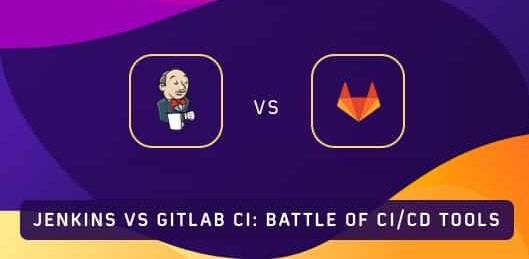Jenkins vs GitLab
Continuous Integration and Continuous Delivery (CI/CD) have become essential practices in modern software development, enabling teams to deliver software rapidly and efficiently. Jenkins and GitLab are two popular tools used in the CI/CD landscape, each offering unique features and capabilities. In this blog post, we will compare Jenkins and GitLab, highlighting their differences and similarities, to help you choose the right CI/CD tool for your development workflow.
Jenkins: The Flexible Automation Server
Jenkins is an open-source automation server that has been a go-to choice for CI/CD pipelines for many years. It provides extensive customization options, a vast collection of plugins, and powerful scripting capabilities.
Key Features of Jenkins
- Extensibility: Jenkins offers a wide range of plugins, allowing you to integrate with various tools, technologies, and platforms. This extensibility enables you to tailor your CI/CD pipelines to fit your specific project requirements.
- Distributed Builds: Jenkins supports distributed builds, enabling you to distribute build and test tasks across multiple machines. This capability enhances scalability and reduces build times.
- Pipeline as Code: Jenkins supports the concept of “Pipeline as Code,” allowing you to define and version your CI/CD pipelines using code. This approach provides flexibility, reusability, and ease of maintenance.
- Community Support: Jenkins benefits from a large and active community that continuously develops and maintains plugins, providing regular updates and support.
GitLab: The Integrated DevOps Platform
GitLab is a complete DevOps platform that provides a single interface for source code management, CI/CD pipelines, project management, and more. It is built on Git and offers an all-in-one solution for the entire software development lifecycle.
Key Features of GitLab
- Integrated Platform: GitLab provides an integrated platform for source code management, issue tracking, CI/CD pipelines, code review, and project management. It offers a single interface and workflow for managing all aspects of the software development process.
- Built-in CI/CD: GitLab has built-in CI/CD capabilities, allowing you to define and automate your pipelines directly within the GitLab interface. It provides a straightforward setup and configuration process, eliminating the need for external tools.
- GitOps and Version Control: GitLab follows the GitOps approach, where all CI/CD pipelines and configurations are stored and versioned in the same Git repository as the source code. This approach ensures transparency, collaboration, and version control of your entire CI/CD process.
- Kubernetes Integration: GitLab has seamless integration with Kubernetes, making it easy to deploy and manage applications in Kubernetes clusters. It provides features like auto DevOps, container registry, and environment management for Kubernetes-based deployments.
Jenkins vs. GitLab: Choosing the Right Tool
When deciding between Jenkins and GitLab for your CI/CD needs, consider the following factors:
- Extensibility vs. Integrated Platform: Jenkins offers extensive extensibility through its plugin ecosystem, allowing you to customize and integrate with various tools. GitLab, on the other hand, provides an all-in-one integrated platform with built-in CI/CD capabilities. Consider whether you prefer the flexibility of customizing your CI/CD environment or the convenience of an integrated platform.
- Pipeline as Code vs. Simplified Configuration: Jenkins excels in its flexibility and the ability to define complex CI/CD pipelines as code using its Pipeline as Code approach. GitLab simplifies the configuration process with its straightforward setup and built-in CI/CD features. Consider your preference for configuring pipelines using code or a visual interface.
- Community Support and Ecosystem: Jenkins benefits from a large and active community with a vast collection of plugins and resources. GitLab has a growing community and offers an integrated platform with features beyond CI/CD. Consider the availability of community support, plugin options, and the overall ecosystem when making your decision.
- GitOps and Kubernetes Integration: GitLab’s GitOps approach and seamless integration with Kubernetes can be advantageous if you are working with Kubernetes-based deployments. Jenkins can work with Kubernetes as well but may require more manual configuration and setup.
Jenkins and GitLab are both powerful tools for implementing CI/CD pipelines, each with its own strengths. Jenkins provides extensive customization options, flexibility, and a robust plugin ecosystem. GitLab offers an integrated DevOps platform, built-in CI/CD features, and seamless GitOps and Kubernetes integration. Consider your preference for extensibility, pipeline configuration, community support, and the need for an all-in-one DevOps platform when choosing between the two tools. Ultimately, the right choice depends on your specific requirements, the scale of your projects, and the preferences of your development team.









